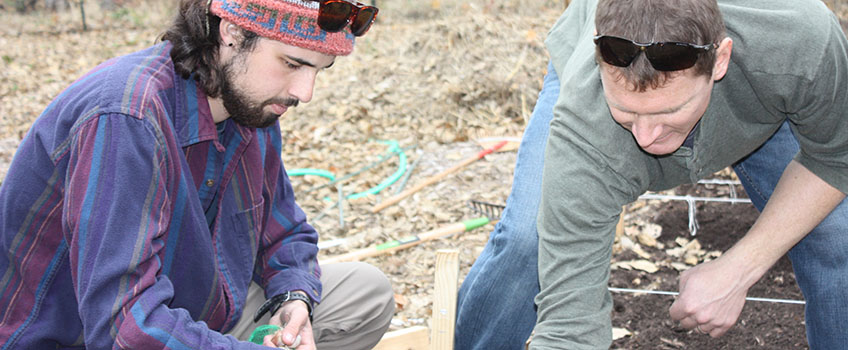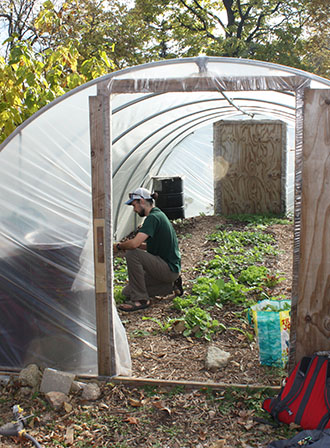The Importance of Student Involvement

On the far northeast corner of campus, a group of faculty and students is putting the idea of sustainability into reality. On a crisp November morning, Senior Environmental Science major Ben Pratscher (above left, with Professor Kuhman) and associate professor Tim Kuhman, along with several other students, planted roughly 1,500 garlic cloves that will be harvested in the spring and used in both dining areas on campus. The garden, mostly hidden from view by a number of trees on either side, complements the existing hoop house adjacent to Dominican Hall, which grows salad greens and spinach. 
Kuhman and Pratscher are leading an effort to get more of the produce from the garden and hoop house to the plates of students in Wingra Café and Phil’s. In addition to majoring in Environmental Science, Pratscher has also completed an internship with Chartwells, the College’s campus dining provider. By being able to link his school work and his food service internship, Ben is serving as a valuable liaison between Edgewood College’s sustainability efforts and dining services.
“I took a class called ‘Garbology,’ a COR 2 class, and part of that was to do a service project. So I looked into on-campus composting, what we were doing and what we could improve. Through that I got involved with the Chartwells liaison, talking about sustainability,” Pratscher says.
Shortly thereafter, Pratscher was offered an internship with Dining Services for the fall 2015 semester. In addition to his major and internship, he’s also is heavily involved with The Wood’s Edge club on campus, which tends the hoop house during the spring semester.
“I think from a student perspective the most important aspect of sustainability is student involvement,” says Pratscher, who is from Fox Point, Wis. “I mean I feel like there are a lot of things done on campus that are sustainable like the LED lights and all that but there’s not a lot of student involvement with them. It’s great that they’re done, but getting students involved and having that opportunity for them to learn more about it is huge. When we do the plant starts in the spring, for kids to even watch a seed turn into a plant…I think it’s really cool…So the educational opportunity behind all the sustainable things on campus for students is huge.”
“The same goes for faculty and staff,” echoes Kuhman. “When they walk by our plant sale and see these beautiful greens and then find out they’re being grown on campus they’re thrilled. It puts the spotlight on something tangible that students and faculty are doing right here on campus.”
A commitment to environmental stewardship and sustainability resonates deeply at the College, a legacy begun by the native people who first cared for this very special 55-acre campus on the shore of Lake Wingra. The College is honored to be part of the legacy of sustainability that we inherit. In addition to undergraduate programs, the College offers the Master of Arts in Sustainability Leadership, and a Graduate Certificate in Sustainability Leadership.
###

 Eagle Athletics
Eagle Athletics